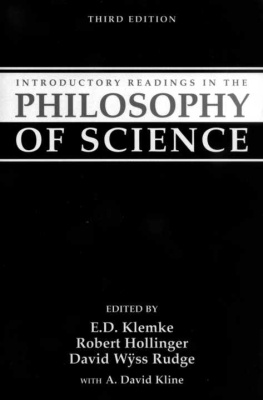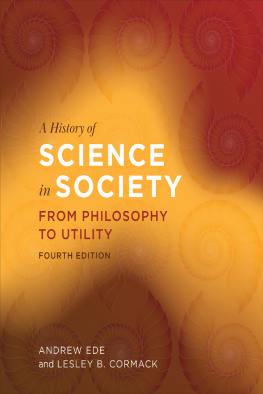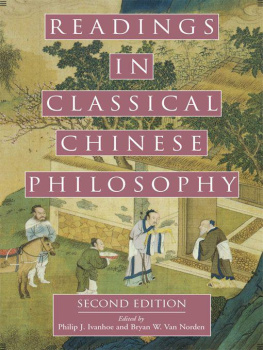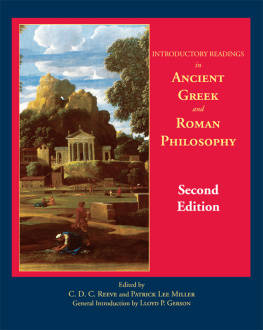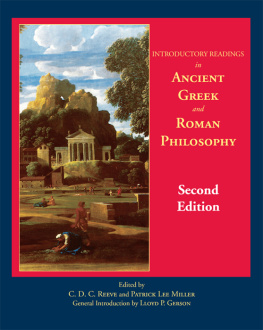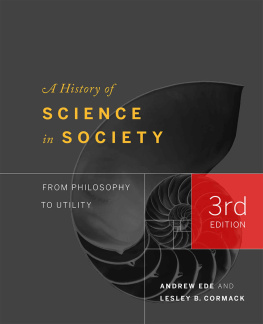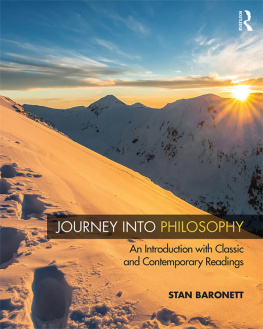E. D. Klemke
WITH A. David Kline





Contents
PART 1. SCIENCE AND PSEUDOSCIENCE
PART 2. THE NATURAL AND SOCIAL SCIENCES
PART 3. EXPLANATION AND LAW
PART 4. THEORY AND OBSERVATION
PART 5. CONFIRMATION AND ACCEPTANCE
PART 6. SCIENCE AND VALUES
APPENDIX
Preface to the Third Edition
The main revision for the third edition is the addition of a section on the natural and the social sciences. This complements the first part, science vs. nonscience, and resonates with issues about explanation, confirmation, science and values, and the role of theory. Part 2 focuses on the way in which these issues generate debates about the nature of the social sciences, and comparisons and contrasts with the natural sciences.
The new readings in part 2 provide an integrated set of papers which address each other, either explicitly (Taylor vs. Kuhn) or implicitly (Rosenberg vs. Machlup). They extend the issues of the other parts into debates about the social and behavioral sciences. These readings also anticipate and expand upon the papers in part 6 (Science and Values), and also throw additional light on Kuhn's views. The readings in the newly revised section on Science and Values (part 6) now include an essay on feminism and science (Giere), which discusses feminism and Positivism, Popper, Kuhn, realism and antirealism. Even the topic of part 1, science vs. nonscience, is discussed in the context of these new essays. Finally, the Hollinger essay, "From Weber to Habermas," is included in the newly revised part 6, to fill a gap in the readings.
We believe that the new part 2 and the revised and expanded part 6 adequately cover material in the old part 6, Science and Culture. We have therefore eliminated this section, except for the essay by Hollinger, and revised the section on Science and Values accordingly. The new material is also more current, since it deals with feminism, postmodernism, and (in the expanded editorial introduction to part 6) the so-called science wars and recent versions of the sociology of science (mainly in the form known as Science and Technology Studies [STS]). These are all topics that are of great interest to the general reading public, as well as to university professors and students.
This book, in its revised and expanded third edition, can be used in standard one-semester courses in the philosophy of science, two-semester courses which spend time on issues in the philosophy of social science and science and culture, and in philosophy of social science courses. We have therefore included outlines for several alternative course syllabuses at the end of the book.
In addition, David Rudge has made significant revisions in part 3 (on explanation). He has added editorial material to explain some of the nuances of Hempel's views about explanation, and has in fact rewritten the editor's introduction to part 3. He has also replaced the Brody and Dray readings with three exciting pieces on explanation, by van Fraassen, Kitcher, and Salmon. The material on explanation is now much more current (adding papers on the pragmatics of explanation and explanation as unification); and part 3 also has more organic unity in this edition. Rudge has also updated the Reading List and Study Questions for part 3. (The reading lists and study questions for part 4 have also been completely revised.)
We have also added "Case Studies" to each part, just before the study questions. These case studies are designed to be specific illustrations of the main topics and issues in each of the book's parts. They connect the theoretical issues discussed in the readings with a particular problem or issue of some sort. Professor Rudge, the only one of the editors who regularly teaches a standard one-semester course in the philosophy of science, has added a pedagogical essay that is addressed to both instructors and students. We think this will help the reader optimize the way in which this book can be used in courses.
E. D. Klemke
Robert Hollinger
David Wyss Rudge
Preface to the Revised Edition
This revised edition, like its predecessor, is a collection of informative, lively, and accessible readings, organized under six main issues, and designed to provide a solid introduction to the problems of the philosophy of science.
We have been gratified by the response of both instructors and students to the first edition of this text. For this new edition we have made a number of what we hope are improvements.
Probably the most often expressed concern with regard to the first edition was the need for a better selection expressing the views of Thomas Kuhn. We not only remedied this but included a paper by Carl Hempel that examines some of the important themes raised by Kuhn.
The first edition did not contain a version of the standard account of theories given that most presentations were far too technical. The now-included essay by Rudolf Carnap is a nice nontechnical representation of the view. For similar reasons we only included a very qualitative discussion of confirmation in the first edition. The selection on the logic of confirmation, now included, was especially written for introductory students by Ronald Giere. It may require some additional help from the instructor but we believe it will be well worth the effort.
The opening part, "Science and Nonscience," has been expanded by one essay. This topic is especially exciting to introductory students. Our earlier suggestion, that one may want to wait until other topics have been covered to take up this issue, still stands.
The final two parts, on science and values and science and culture, which also have proven to be quite interesting to a variety of undergraduates, have been significantly revised. We eliminated essays that were too difficult or repetitive. The new essays also relate more directly to issues in the previous sections.
We would like to express our deep gratitude to all those people who helped us, in various ways, to prepare this book. In addition to the many who aided us with the first edition (see the preface to that edition, reprinted in this volume), for this new edition we are grateful to Carl Matheson, Warren Asher, Bernice Power, Edna Wiser, Ray Amsler, and Steven L. Mitchell and the entire staff of Prometheus Books.
Finally, we hope that instructors and students who have comments or suggestions for improving the volume or who wish to convey their evaluation of it will contact the editors.
E. D. Klemke
Robert Hollinger
A. David Kline
Preface to the First Edition
It is a truism that in our time science has become a highly respected and venerated enterprise. It is widely deemed to be a Good Thing. There are many who hold it to be the most successful pursuit of knowledge in the history of the world. Others consider it to be the noblest intellectual achievement of mankind. It is also true that (in recent years, especially) many have found science to be undeserving of such high praise. Not only has science been attacked by proponents of ESP, astrology, and other pseudosciences, and by critics of modern technology; it has even been found wanting by some scientists and ex-scientists and others who know and write about science. (See Paul Feyerabend's essay in Part I of this volume.) Who is right, or more nearly correct, in this controversy?

